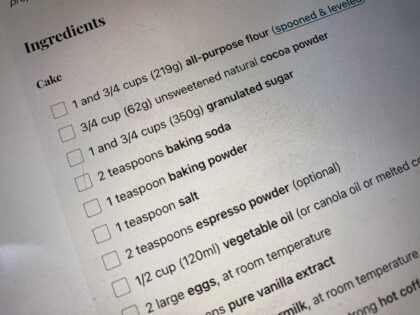I love baking. Just as soon as any capable adult allowed me, I was interested in learning how to make things. Cakes, pies, cookies, biscuits, and more — I was delighted to discover that there was a recipe for almost anything you could imagine.
Want cinnamon buns? apple pie? chocolate cake? muffins? bread? There’s a recipe for that! The world was in my grasp – I just needed the recipes.
And then I discovered that not all recipes are created equal. Some were clumsy, or just cheap shortcuts whose end results were utterly unsatisfying. Wedding cake made from Twinkies and Cool-Whip, I’m looking at you! While I read that recipe with astonishment, I did have the sense not to make that.
Other recipes gave good results, but worth the effort for a home baker? Nope. Fig Newtons from scratch, for example. My siblings polished off about 6 hours of work in 20 minutes. If I want them, I buy them.
In one memorable episode, I decided to attempt a butter danish from scratch. This requires a laminated dough built of 128 layers rolled out by hand while incorporating cold stiff butter. It was exhausting, and in the end, while good, produced uneven results. Visiting a friend who was a professional baker, I was sharing some 4 am coffee with him as he started the day’s baking. When I complained about butter danish being such an exhausting dough, he frowned. “Difficult? Not really. I’ll show you!” And he grabbed the dough, the butter, folded them together and fed it all into a nifty professional machine that effortlessly produced a multi-layered dough in just a few passes. “See? Nothing to it.”
Which is when I realized that what a professional with knowledge, skill and training can accomplish is not always within easy reach of the home baker. Professional tools and specific quality ingredients exist for a reason. Lesson learned!
Baking is scientific. It is a series of chemical reactions between ingredients that happen at a certain point of mixing, or after specific time, or at a specific temperature. There is leeway, of course, provided you know what you’re messing with! Leave a rising yeast dough too long in a warm room and it does not go well. Need to leave it to dash a dog to the vet with a cut paw? Knowing to pop it in the refrigerator saves the day and might even improve the flavor.
While I am a good hands-on baker, I had enough disasters and “not quite what I hoped for!” results to send me in search of more technical knowledge. Turns out you cannot substitute or leave things out or double up on ingredients without consequences. Learning why things went wrong, and most importantly why things go right has taken my baking to a new level, though I am still just an enthusiastic amateur.
Why am I sharing this on a blog mostly read by dog trainers? Because animals training is a lot like baking. We see beautiful results, and we want them. We seek out the recipes that should – in theory! – produce those results. And then we learn that so many small decisions along the way can make a world of differences. Many of those small decisions escape our notice, because we’ve not been trained to notice them. What is “butter, softened”? Or, most critically, what the heck is “room temperature”??? I mean, really, exactly whose room are we talking about? (Answers, for those who care: light fingertip pressure leaves an indentation; approx. 67 degrees F).
For those working on training animals, we learn to see things in more nuanced ways. We understand that long before the dog is barking at us, we’ll see tell-tale cheek puffs or shifts in the shape of the eyes. We learn to give information while the dog is considering something, when the intent is forming, not as she launches. We learn that patience can mean a long, long time, not just seconds. And on and on, our learning continues, endlessly.
I know many recipes, and I keep sifting through to find only those which help me keep the light alive in those eyes looking back at me. Only that makes it into my cookbook, and every “recipe” has many notes about what must be considered, and under what conditions that recipe will prove helpful, and when that recipe is not what that dog or handler or moment needs.
As long as I’ve been a trainer, I’ve continued to learn and grow. Which is a lovely, uplifting way to say I’ve continued to make mistakes, exercise poor judgement, have inadequate skill or knowledge, and still keep trying to better, every day, on behalf on the animals in my hands.
Which bring us to the Cake Mistake. Experience, recipes and all the technicalities in the world don’t necessarily prevent mistakes. But it can help you make things right.

